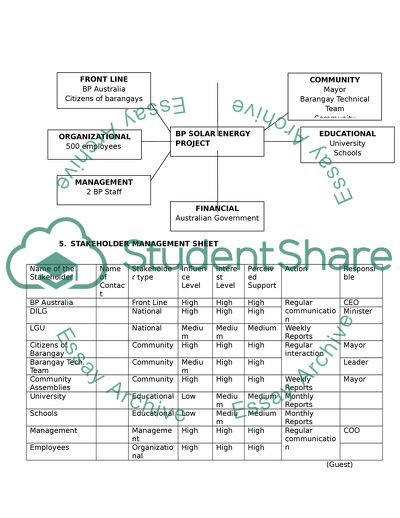
- Home
- Free Samples
- Premium Essays
- Editing Services
- Extra Tools
- Essay Writing Help
- About Us
500 - Essay Example

- Subject: Miscellaneous
- Type: Essay
- Level: Undergraduate
- Pages: 4 (1000 words)
- Downloads: 0
- Author: ianschaefer
Extract of sample "500"
Philippines is a conglomeration of 7100 islands with over 6000 of them uninhabited. These are tiny individual islands with less than half of them exceeding 2.5 square kilometers in area. Many of the villages (Barangays) located in these cluster of islands are difficult to access. Thus access to electricity eludes many (Singleton, 2003). BP Solar Australia drew up a project for large-scale harnessing of solar power to the rural populace and submitted to the Philippines government, which was approved (Singleton, 2003).
This project was completed with satisfactory results to the stakeholders . The role of stakeholders is all pervading. The stakeholders are the cause of the project. The projects are conceived to satisfy collective expectations of the stakeholders. It is not adequate if the project meets the cost estimates and the time schedule and fulfills the scope. It should satisfy the stakeholders. In the context of project management, Governance would demand visibility on project progress to the stakeholders till its effective completion as acknowledged by the stakeholders.
This analysis portrays the complexities in project management. It shows that the success of the project is assessed not only by meeting the cost, time and scope targets laid down at the conceptual stage; it should also meet the expectations of the stakeholders. The applicability of this analysis covers the entire realm of project management. While the cost, time and scope is determined at the conceptual stage of the project, the stakeholders expectations could vary over time. Effective sharing of information periodically with the stakeholders would reduce the probability of stakeholders’ discontent.
It therefore demands the tact and diplomacy of the project manager to resolve often conflicting interests among the stakeholders. For instance, in the project being studied, BP Solar Australia and the Australian Government have enrolled the other stakeholders in their
...Download file to see next pages Read MoreCHECK THESE SAMPLES OF 500
Fiat 500 by Diesel
Fortune 500 Company Analysis
Fortune Global 500 Corporation
Forbes 500: Steven Spielberg
500 words Travel proposal
HSCO 500 DB1 Replies
HSCO 500 Working Outline
Various Aspects of Indianapolis 500

- TERMS & CONDITIONS
- PRIVACY POLICY
- COOKIES POLICY